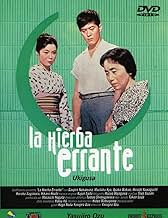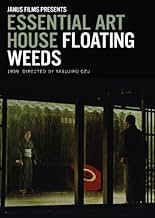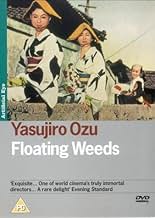IMDb RATING
7.9/10
9.2K
YOUR RATING
The head of a Japanese theatre troupe returns to a small coastal town where he left a son who thinks he is his uncle, and tries to make up for the lost time, but his current mistress grows j... Read allThe head of a Japanese theatre troupe returns to a small coastal town where he left a son who thinks he is his uncle, and tries to make up for the lost time, but his current mistress grows jealous.The head of a Japanese theatre troupe returns to a small coastal town where he left a son who thinks he is his uncle, and tries to make up for the lost time, but his current mistress grows jealous.
- Director
- Writers
- All cast & crew
- Production, box office & more at IMDbPro
Storyline
Did you know
- TriviaStated by cinematographer Kazuo Miyagawa about director Yasujirô Ozu: "I'll never forget that, from the first day on, he knew the names of everybody on the set, fifty people in the crew, people he'd never worked with. He'd written their names down, I learned later. But everyone was impressed and became devoted to him. Every single day working on this film was extremely pleasurable and enriching. In each of Ozu's films you can sniff his personality. He was pure, gentle, light-hearted, a fine individual."
- GoofsNear the end, sandals disappear or move around: after Kiyoshi argues with his father, he runs upstairs, first slipping out of his sandals and leaving them at the bottom (center) of the stairs. Moments later, Kayo goes up to him. We see that she, too, removes her sandals at the bottom of the stairs. But Kiyoshi's sandals have now suddenly disappeared: we see only Kayo's sandals at the bottom of the stairs. Moments later, Kiyoshi comes back downstairs to go after his father. He goes to put on his sandals, which have now suddenly reappeared, but in a different location from where he took them off. A moment later, Kayo also comes down the stairs and puts on her sandals, which are approximately where she had removed them and placed them, moments earlier.
- Quotes
Komajuro Arashi: You can't help an empty house, when it's empty.
- ConnectionsFeatured in Transcendental Style and Flatulence (2017)
- SoundtracksWasurecha iyayo (aka: Don't forget me)
Composed by Yoshikatsu Hoshoda
Sang by the play troupe on a ship
Featured review
I wrote this after I saw my first Ozu's film, "Tokyo Story" about a year ago: "As with every great work, the film has its own unique perfection in style, rhythm, details, and artist's vision - but Tokyo Story is very universal in its appeal, simply put, it is for every parent, every son or daughter - for everyone. It was made 50 years ago in Japan, about people who lived far away, but it is also about all of us, our families, our problems, our guilt and our search for love and meaning. Ozu's film does not require one to be a movie buff or to try to solve complex symbolism to appreciate and love it. It brings smiles because it is a comedy (for at least the first 2/3) and sadness with a high drama of the last 1/3 of the film."
I feel absolutely the same about "Floating Weeds". The film is quiet and deceptively simple but its simplicity reminded me the words of Michelangelo Buanorotti. When asked how he created the perfect statues from the shapeless marble lumps, he answered, "It is very simple, you just cut off all unnecessary pieces".
Ozu's films are perfect - they touch us with rare warmth, soft enveloping tenderness and power of human emotions not necessarily with striking visual or sound effects. "Floating Weeds" is a remake of earlier silent black and white Ozu's film "The Story of Floating Weeds". The story is simple: an aging, traveling actor who is the manager of a kabuki troupe returns to a remote village where he secretly meets his former lover and her 19 year old illegitimate son, to whom he is known as "uncle." The older man finds happiness in communicating with his son who turned to be a fine young man. His current mistress, filled with jealousy because of his attachment to his secret family, hires a young beautiful girl, the member of a troupe to seduce a boy. Something in this story attracted Ozu so much that he remade the film twenty five years later.
"Floating Weeds" is a beautiful color film and it is the first color Ozu's film for me. The colors are bright and fresh, tender and kind - they match the director's style perfectly. The delightful music by Kojun Saito reminds me of Nina Rota music in Fellini's films - nostalgic, innocent and rhythmic.
I feel absolutely the same about "Floating Weeds". The film is quiet and deceptively simple but its simplicity reminded me the words of Michelangelo Buanorotti. When asked how he created the perfect statues from the shapeless marble lumps, he answered, "It is very simple, you just cut off all unnecessary pieces".
Ozu's films are perfect - they touch us with rare warmth, soft enveloping tenderness and power of human emotions not necessarily with striking visual or sound effects. "Floating Weeds" is a remake of earlier silent black and white Ozu's film "The Story of Floating Weeds". The story is simple: an aging, traveling actor who is the manager of a kabuki troupe returns to a remote village where he secretly meets his former lover and her 19 year old illegitimate son, to whom he is known as "uncle." The older man finds happiness in communicating with his son who turned to be a fine young man. His current mistress, filled with jealousy because of his attachment to his secret family, hires a young beautiful girl, the member of a troupe to seduce a boy. Something in this story attracted Ozu so much that he remade the film twenty five years later.
"Floating Weeds" is a beautiful color film and it is the first color Ozu's film for me. The colors are bright and fresh, tender and kind - they match the director's style perfectly. The delightful music by Kojun Saito reminds me of Nina Rota music in Fellini's films - nostalgic, innocent and rhythmic.
- Galina_movie_fan
- Apr 26, 2005
- Permalink
- How long is Floating Weeds?Powered by Alexa
Details
- Release date
- Country of origin
- Language
- Also known as
- Abschied in der Dämmerung
- Filming locations
- Production company
- See more company credits at IMDbPro
- Runtime1 hour 59 minutes
- Aspect ratio
- 1.37 : 1
Contribute to this page
Suggest an edit or add missing content























